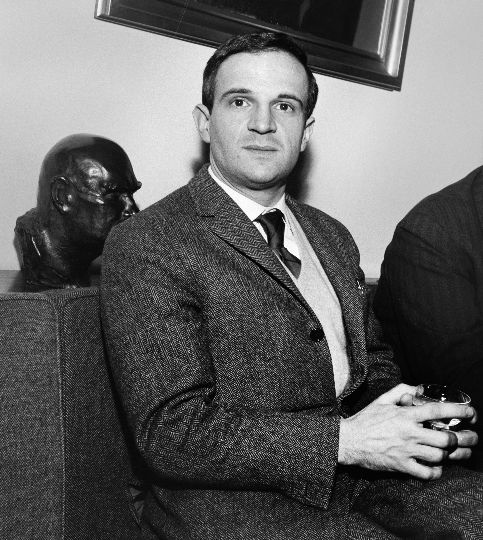|
La Chambre Verte
''The Green Room'' (french: La Chambre verte) is a 1978 French historical drama film directed by François Truffaut, based on the 1895 short story " The Altar of the Dead" by Henry James, in which a man becomes obsessed with the dead people in his life and builds a memorial to them. It is also based on two other works by James: the 1903 novella ''The Beast in the Jungle'' and the 1896 short story "The Way It Came". It was Truffaut's seventeenth feature film as a director and the third and last of his own films in which he acted in a leading role. It stars Truffaut, Nathalie Baye, Jean Dasté and Patrick Maléon. Truffaut spent several years working on the film's script and felt a special connection to the theme of honouring and remembering the dead. In the film, he included portraits of people from his own life at the main character's "Altar of the Dead". ''The Green Room'' was one of Truffaut's most praised films, and also one of his least successful financially. Plot The action ... [...More Info...] [...Related Items...] OR: [Wikipedia] [Google] [Baidu] |
François Truffaut
François Roland Truffaut ( , ; ; 6 February 1932 – 21 October 1984) was a French film director, screenwriter, producer, actor, and film critic. He is widely regarded as one of the founders of the French New Wave. After a career of more than 25 years, he remains an icon of the Cinema of France, French film industry, having worked on over 25 films. Truffaut's film ''The 400 Blows'' (1959) is a defining film of the French New Wave movement, and has four sequels, ''Antoine et Colette'' (1962), ''Stolen Kisses'' (1968), ''Bed and Board (1970 film), Bed and Board'' (1970), and ''Love on the Run (1979 film), Love on the Run'' (1979). Truffaut's 1973 film ''Day for Night (film), Day for Night'' earned him critical acclaim and several awards, including the BAFTA Award for Best Film and the Academy Award for Best Foreign Language Film. His other notable films include ''Shoot the Piano Player'' (1960), ''Jules and Jim'' (1962), ''The Soft Skin'' (1964), ''The Wild Child'' (1970), ''T ... [...More Info...] [...Related Items...] OR: [Wikipedia] [Google] [Baidu] |
Anton Chekov
Anton Pavlovich Chekhov (; 29 January 1860 Old Style date 17 January. – 15 July 1904 Old Style date 2 July.) was a Russian playwright and short-story writer who is considered to be one of the greatest writers of all time. His career as a playwright produced four classics, and his best short stories are held in high esteem by writers and critics."Stories ... which are among the supreme achievements in prose narrative.Vodka miniatures, belching and angry cats George Steiner's review of ''The Undiscovered Chekhov'', in ''The Observer'', 13 May 2001. Retrieved 16 February 2007. Along with Henrik Ibsen and August Strindberg, Chekhov is often referred to as one of the three seminal figures in the birth of early modernism in the theatre. Chekhov was a physician by profession. "Medicine is my lawful wife", he once said, "and literature is my mistress." Chekhov renounced the theatre after the reception of ''The Seagull'' in 1896, but the play was revived to acclaim in 1 ... [...More Info...] [...Related Items...] OR: [Wikipedia] [Google] [Baidu] |
Shoot The Piano Player
''Shoot the Piano Player'' (french: Tirez sur le pianiste; UK title: ''Shoot the Pianist'') is a 1960 French New Wave crime drama film directed by François Truffaut that stars Charles Aznavour as the titular pianist with Marie Dubois, Nicole Berger, and Michèle Mercier as the three women in his life. It is based on the novel ''Down There'' by David Goodis. Plot In Paris, Édouard Saroyan hits rock bottom after his wife Thérèse confesses that his career as a concert pianist is due to her having slept with a top agent and, when he fails to respond, kills herself. Under the assumed name of Charlie Koller, he now strokes the keys in Plyne's bar and, when she has no client, spends the rest of the night with Clarisse, a prostitute who also cooks for his little brother Fido. The bar's waitress, Léna, is falling in love with Charlie and she secretly knows his true identity. When his two older brothers steal the loot of a pair of gangsters, the men abduct Charlie and Léna, who escap ... [...More Info...] [...Related Items...] OR: [Wikipedia] [Google] [Baidu] |
Le Matin De Paris
''Le Matin de Paris'' was a French daily newspaper, founded on 1 March 1977 by Claude Perdriel, and disappearing in 1987 ("dépôt de bilan" on 6 May). Its foundation is the subject of the documentary ''Numéros zéro'' by Raymond Depardon. History The daily of the ''Nouvel Observateur'' Founded in 1977 by the chief executive of ''Le Nouvel Observateur'', ''Le Matin de Paris'' shared its director, capital, journalists and structures with Jean Daniel's weekly paper. These links were at first capitalistic in nature in which, by the bias of the SA ''Le Nouvel Observateur du Monde'' (with 2 million Francs) or by that of its CEO Claude Perdriel (with 2.24 million Francs), the weekly and its director controlled 53% of its initial capital. Later, in February 1978, ''Le Nouvel Observateur'' put 1 750 000 francs at ''Le Matins disposal, constituting new financial assistance opposed by the personnel of ''Le Nouvel Observateur''. This financial support was brought about on the daily n ... [...More Info...] [...Related Items...] OR: [Wikipedia] [Google] [Baidu] |

